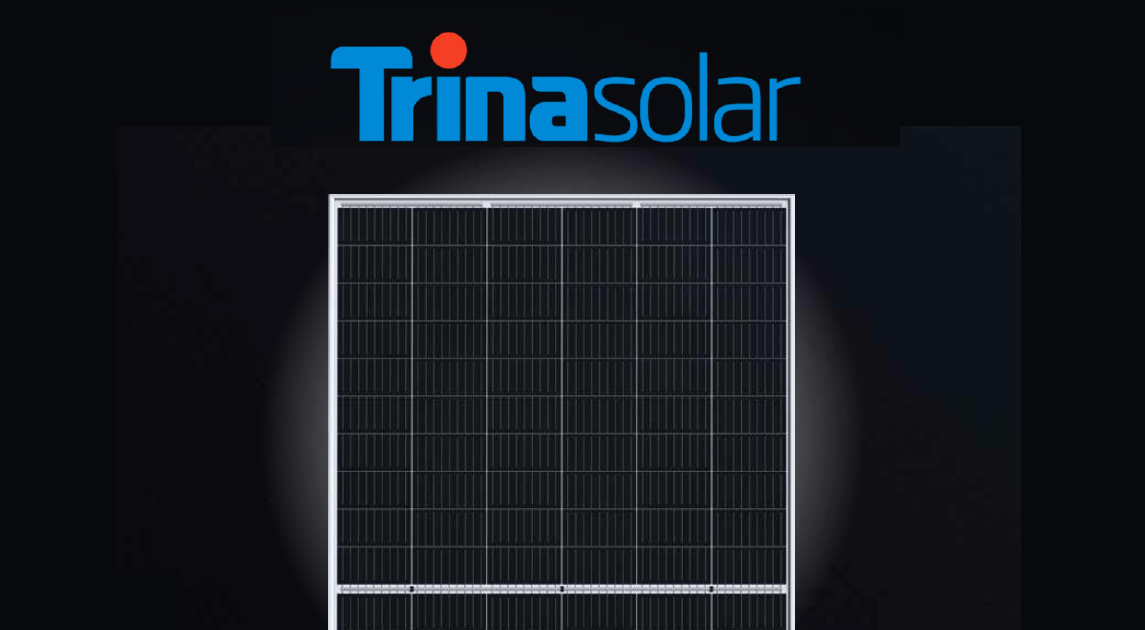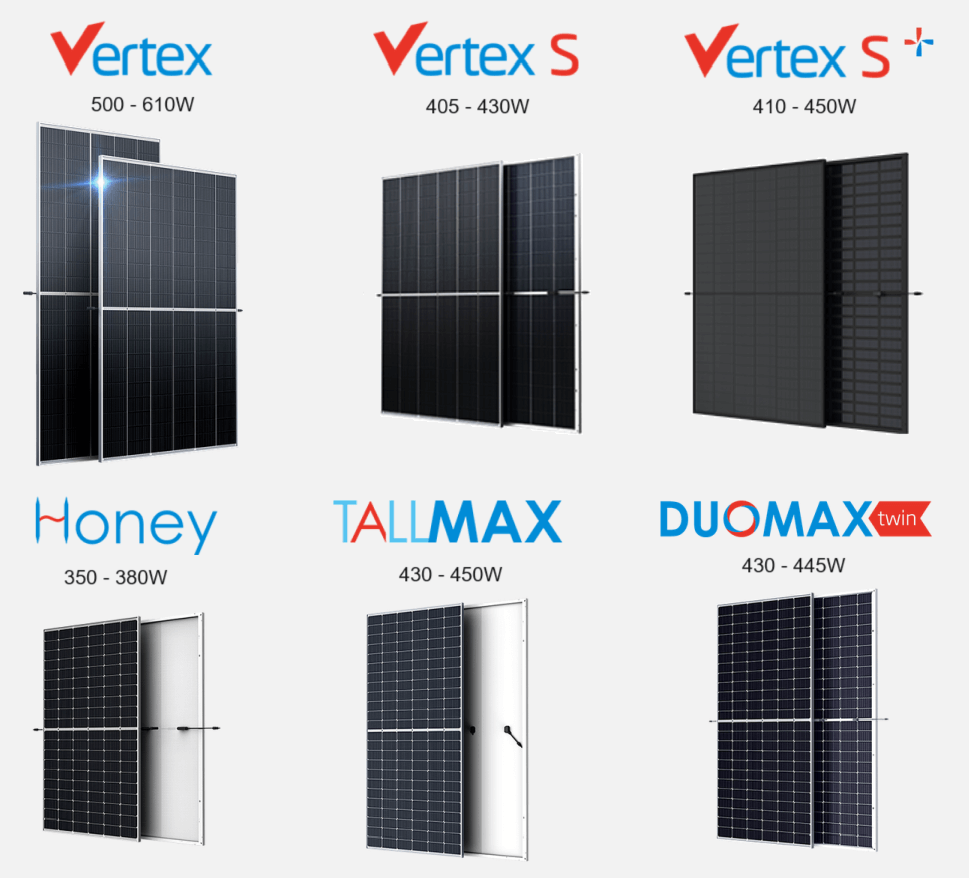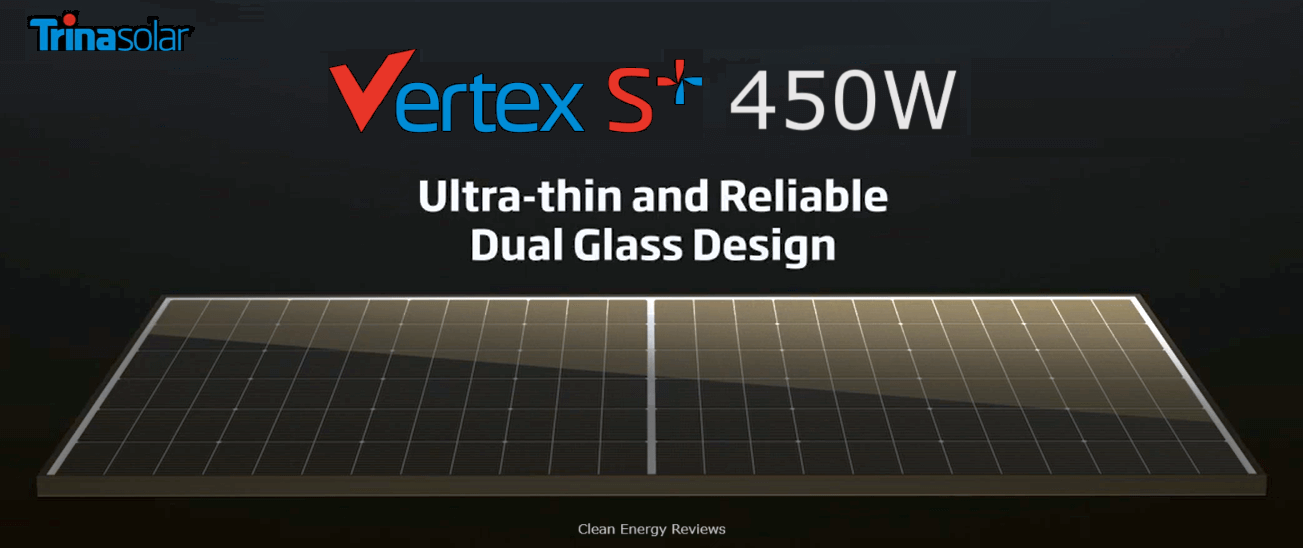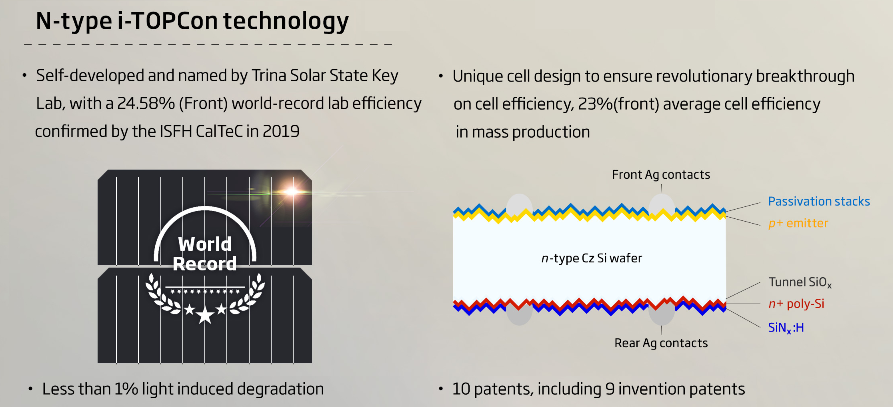Trina Solar Panels Review
home > solar panels > best solar panels review > Trina Solar Panels Review
Trina Solar Panels Overview
Trina Solar is one of the largest vertically integrated solar panel manufacturers in the world and is known to produce affordable and reliable solar panels for a wide range of different applications. Over the last few years, Trina Solar has become one of the leaders in innovation, which is highlighted by the new Vertex range of panels that are packed with the latest solar cell technology and have pushed the efficiency close to the level of the premium manufacturers.
Trina Solar Panels Quick Summary
Power ratings (Watts): 370W - 670W
Panel Efficiency %: High - 19.8% - 22.5%
Cell technology: P-type and N-type TOPCon
Price bracket: Low-med $$$
Most popular panel: Vertex S 415W
Product Warranty: Very good - 12 to 30 years
Service and support: Very good 4/5
Overall: Recommended ☆☆☆☆☆
Company History
As one of the top five solar panel suppliers in the world, Trina Solar has a solid reputation and vast global distribution network across 30 countries. Founded in 1997, Trina is a fully vertically integrated company and one of the oldest Chinese solar panel manufacturers. Over the last few decades, Trina’s strong focus on research and development has led to some great achievements, including 18 solar PV world records in cell and panel efficiency.
Trina Solar is ranked one of the top Tier 1 solar panel manufacturers by Bloomberg New Energy Finance. However, it should be noted that the Tier 1 ranking is more a measure of a company’s financial stability, which is very important for large utility-scale installations requiring long-term project viability.
Like many large Chinese manufacturers, Trina Solar focuses on performance and value for money. Trina does not generally compete in the more expensive, premium end of the market with Sunpower (USA) and REC (Singapore). However, Trina does offer some very high-performance products, including the Vertex series featuring N-type TOPCon cells, which have boosted power ratings well over 600 watts, making them some of the most powerful solar panels in the world. The new Vertex S+ series panels are also pushing 22.6% efficiency, bringing them on par with many premium brands.
Trina Solar Panel Range
Trina Solar manufactures an extensive range of solar panels for residential, commercial and utility-scale installations, incorporating many of the latest cell technologies, including multi-busbar PERC cells, large 210mm third-cut cells, and, more recently, the high-density panel format with N-type TOPCon monocrystalline cells.
Honey 350 - 380W: Most cost-effective
Vertex S 405 - 430W: Good value residential panels
Vertex S+ 410 - 450W: High-efficiency residential panels
TallMax 430 - 450W: Commercial panels
DuoMax Twin 430 - 445W: Bifacial utility panels
Vertex N 670 - 700W: N-type i-TOPCon bifacial dual glass utility panels
The complete range of Trina solar residential and commercial panels for 2023
The new Vertex range is the most popular residential panel in the Trina line-up. The older, more cost-effective Honey series is still available in sizes up to 380W. For larger commercial and utility-scale installations, Trina Solar offers high voltage (1500V) larger format 72 or 144 half-cut cell panels in the TallMax and DuoMax bifacial range, with sizes now exceeding 600W. Trina also produces specialised dual glass and advanced bifacial options with 30-year performance warranties.
The Vertex series feature Monocrystalline PERC cells with high-density, multi-busbar (MBB) interconnections to achieve efficiencies up to 21.3%. More notably, they are the first panels built on the new larger format 210mm cell size using the unique 1/3 cut cells (as opposed to the standard half-cut cells). The high-power vertex panels are much larger, coming in at 2.1 -2.3m high and 1.10-1.35m wide, significantly larger than the older standard commercial size (2m x 1m) panels and designed for use on utility-scale solar farms.
Vertex S 405W - 430W panels
Unlike the larger Vertex panels, the lighter, more compact Vertex S panels are designed for residential and commercial rooftops, with the S referring to the smaller size. The medium powered 405W to 430W panels utilise the same mono-PERC, MBB, high-density panel format to achieve a maximum efficiency of 21.8% and peak power rating of 430W.
Download the full Trina Solar Vertex S datasheet.
New Vertex S+ 450W Panels
The latest module in the Trina lineup is the Vertex S+ series, which is by far the most advanced and efficient panel produced by the company. The panels feature a maximum power rating of 450W and a maximum efficiency of 22.5%, which is on par with some of the most efficient solar panels available. To achieve such high power and efficiency in a compact-sized panel, Trina used their latest N-Type TOPCon cell technology (named PACO) along with high-density cells and multi-busbars.
New Trina Vertex S+ dual-glass panel specifications and features - Image credit Trina Solar
Dual Glass Design
Surprisingly, Trina engineered the Vertex S+ panels in a new dual-glass design utilising 1.6mm thick toughened glass on either side of the cells, as opposed to the standard design using a single 3.2mm sheet of glass and a polymer (plastic) back sheet. Bifacial panels use the same dual-glass design to allow reflected light to enter the rear side of the panel and increase efficiency. The dual-glass design also helps increase reliability and lifespan, eliminating the risks associated with polymer back sheet degradation and water ingress.
The Vertex S+ is also the first panel from Trina Solar to be backed by a 25-year product warranty and a 30-year performance warranty, thanks to the lower degradation rate of the high-purity N-type cell substrate. The first-year degradation is 1%, followed by a minimal 0.4% degradation every other year until year 30. This guarantees at least 87.4% power output after 30 years of use.
Download the full Trina Solar Vertex S+ datasheet.
Trina Honey
The older Honey range of panels offers a good combination of quality, performance and value for money. The latest Honey M range, built on monocrystalline cells, has increased efficiency over the previous range by using new half-cut PERC cells incorporating nine busbars (MBB). The new Honey M range is available in sizes from 350W up to 380W, with the Honey M black (shown opposite) using a black back sheet for a sleek all-black look.
Efficiency has been boosted up to 20.7% on the latest 380W panel, using the latest large format mono PERC, MBB cells.
Download the full Trina Honey M plus specification datasheet.
Vertex N high-power 600W+ panels
Over the last few years, there has been a global race to develop the most powerful solar panels, with Trina Solar leading the charge. The first of the new generation Vertex panels from Trina Solar was showcased early in 2020 and achieved an impressive 515.8W based on an independent test evaluation from TUV Rheinland. This breakthrough was made after Trina began manufacturing the new Vertex panels on a small-scale pilot line. A few months later, at the SNEC PV Power Expo in China, Trina showcased an incredible 660W Vertex panel. Early in 2021, Trina launched the 670W Vertex panel with an impressive 21.6% efficiency, making it one of the most efficient panels available for large utility-scale applications. More recently, Trina launched the high-performance Vertex N series based on the high-purity, longer-lasting N-type i-TOPCon cell technology to deliver an impressive 670 to 700W with a maximum efficiency of 22.6%.
Download the latest Trina Solar Vertex N datasheet.
Advanced Solar Cell Technology
Trina’s product roadmap paves the way for a number of new high-efficiency cell technologies, including a unique N-type i-TOPCon cell, multi-busbars or MBB cells, and advanced bifacial cells.
The record breaking new generation N-type i-TOPCon cell technology from Trina Solar.
The focus on developing high-efficiency N-type cells is becoming more common among the top Chinese manufacturers, although Trina is at the forefront of this technology. Similar N-type panels have been available from premium manufacturers such as LG & Sunpower for a long time, although at a premium price. As Trina and other manufacturers increase production volume and investment in N-type cell technology, this will help drive down the price of these high-performance cells and panels.
The Vertex panels feature a high-density cell format to further increase efficiency - Image credit Trina Solar
Multi-Busbars - MBB
Trina were one for the first Chinese manufacturer’s to offer multi-busbar technology or MBB on the full range of new modules.
The reason for the transition to MBB is rather simple, to increase efficiency and reliability. One problem with the traditional flat ribbon busbars on the front of the cell is that they partially shade the cell, which reduces efficiency and performance. MBB technology is way to increase performance and efficiency by reducing the effects of shading from traditional ribbon busbars. Further benefits include, reduced cell temperature and in turn, reduced risk of hot spot formation in the rare event of a cell fracture.
Trina panels feature MBB (9 busbars) to increase performance and efficiency - Image credit Trina Solar
MBB technology incorporates multiple small round wire busbars and is similar to the premium LG Neon 2 panels which have been available for several years. Trina is now bringing this high-efficiency innovation to the masses through high volume production and further cost reductions.
Bifacial Solar panels
Bifacial solar panels have been available for many years but are only now becoming popular as the cost to manufacture the high-performance PERC monocrystalline cells continues to decrease. Bifacial cells absorb light from both sides of the panel and in the right location and conditions can produce up to 30% more energy than traditional monofacial panels. Trina Solar has been at the forefront of bifacial cell technology and the new DuoMax Twin panels use a combination of PERC, half-cut, MBB, bifacial cells housed in a dual-glass panel. Bifacial panels perform best mounted on single-axis tracking systems mounted over light coloured surfaces such as sand or even snow.
Read more about the latest solar cell innovations including MBB, PERC and bifacial panels in the complete Solar Module Technology Review.
Quality and Performance
One of the world’s leading independent solar module testing and performance services PVEL (DNV-GL), a German-based testing facility, produce the annual PV Module Reliability Scorecard Report. Over the last six years, various Trina solar panels have consistently scored as a ‘Top performer’ among 20+ of the world’s leading solar brands tested. A top performer does not mean they are ranked as number 1 but among the highest performing modules in the group with no severe degradation or failures.
PVEL is one of the world’s most reputable, independent solar PV testing organisations, thus the results provide a high level of confidence in the long term performance and reliability of Trina Solar modules for both large and small scale installations.
Quality Control
Along with many other large manufacturers, Trina solar did have some quality issues over the years which were primarily the result of back-sheet degradation and failure leading to water ingress or PID issues. Fortunately, this was mainly limited to panels sold between 2011 and 2014 and related to an alternative back-sheet or EVA material being used during manufacture. Recent panels do not have any recorded issues, but this does not mean there will not be faults in the future. As with all large-volume manufacturers, there is bound to be an occasional batch or a small number of panels with issues.
Often, when it comes to quality issues, the big difference is how a manufacturer handles these problems and supports the installers and customers. As we explain in the next section, this is one area where Trina has really improved.
Warranty and Service
Trina solar offers a standard 12-year manufacturer’s product warranty, which guards against defects for the first 12 years, plus a 25-year performance warranty to guarantee a minimum 84% power output rating after 25 years of use. The Vertex and Vertex S panels have a longer 15-year product warranty period with options to extend up to 25 years, while the Vertex S+ panels are backed by an impressive 25-year product warranty and 30-year performance warranty. Trina Solar has many support/service centres across the globe, with the Australian service office based in Sydney.
Improved warranty support
Things have improved significantly since our first Trina solar review in 2018, with a much higher level of service and support in the event of a warranty claim or panel failure. Based on our previous Australian solar installer survey, Trina’s service and support were average in case of a quality issue or claim, with mixed feedback of positive and negative responses over the years. However, the latest feedback from solar professionals has elevated Trina to one of the top performers in supporting warranty claims, with a streamlined process and vastly improved customer service. See the Trina website for warranty claims.
The 30-year performance warranty on the new Trina Solar Vertex S+ panels featuring lower degradation N-type cells.
Sustainability awards
Like many of the more prominent manufacturers, Trina Solar has begun focusing more on its supply chain to reduce waste and emissions through more efficient manufacturing processes and greater corporate responsibility. The well-known SVTC scorecard gives Trina Solar an impressive 99 out of 100. This includes improved working conditions and “Takes responsibility for the environmental and health impacts of its products throughout their lifecycles, including adherence to a mandatory policy for responsible recycling.” Additionally, Trina Solar was recently awarded the Life Cycle Assessment (LCA) certificate for its 210mm Vertex modules by TÜV Rheinland. LCA follows the requirements of ISO 14040/ISO 14044 to conduct stringent tests of life-cycle carbon emissions, and the Trina Vertex series showed outstanding results for their low carbon emissions.
In January 2021 Trina Solar also received a dual “Environmental Product Declaration” (EPD) certification from the global independent safety science certification institute. The EPD certification is obtained for sustainable manufacture through tracking the environmental impact, raw materials, manufacturing, processing, transportation, and recycling.
Summary
Trina Solar is considered among the best value manufacturers offering affordable and reliable solar panels. This reputation has been reinforced by improved customer service over recent years and huge advancements in solar cell technology with increased efficiency resulting in higher power ratings.
With the new Vertex and Vertex S+ range of high-performance panels, Trina Solar has become one of the industry leaders in PV cell innovation and helped push the development of high-efficiency cell technology while driving down costs. Additionally, being one of the top 5 manufacturers globally and showing very good results in the PVEL independent testing program provides extra confidence Trina panels will perform well for many years. Based on Trina Solar’s long history, reputation, and Tier 1 rating under the Bloomberg New Energy Finance (BNEF) ranking system, you could almost guarantee Trina will be around for a long time to support quality or performance issues should they occur well into the future.
The majority of Trina Solar Panels are backed by a standard 12-year product warranty and 25-year performance warranty, with a longer 15-year product and 30-year performance warranty offered on the new generation bifacial and Vertex panels. The new Vertex S+ (plus) panels are the first from Trina Solar to be supported by a 25-year product and 30-year performance warranty.










